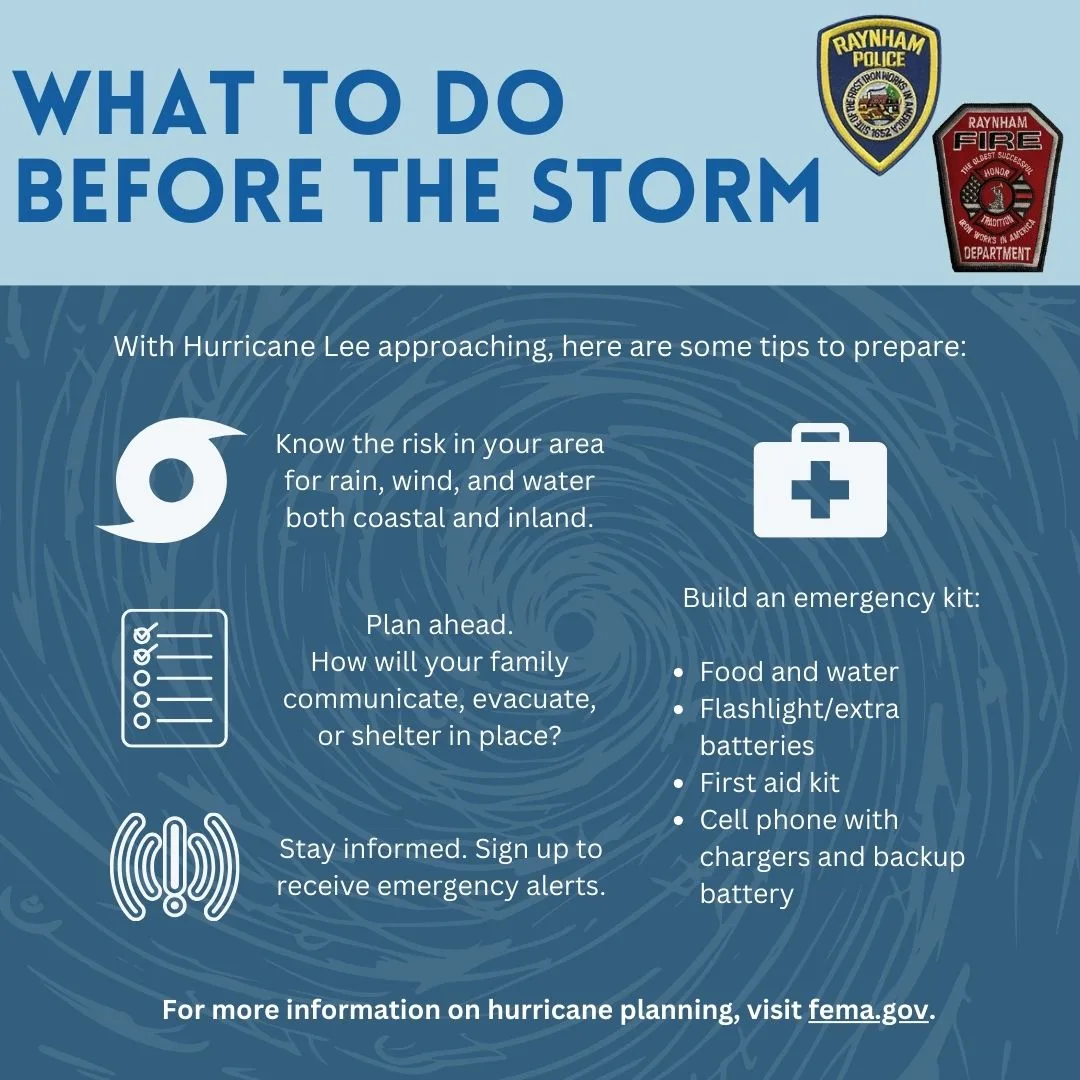RAYNHAM — Fire Chief Bryan LaCivita and Police Chief David LaPlante are asking residents to remain alert and take necessary precautions as Hurricane Lee is expected to track toward New England in the coming days.
According to the National Hurricane Center, Lee is moving toward the north-northwest and a turn toward the north is expected by tonight.
Public safety officials are receiving briefings as the situation is updated, and are staying current on storm tracks and forecasts to ensure staffing is in place to deal with any emergency.
Hurricanes can bring many different types of wind and water hazards, including storm surges, strong winds and flooding. The Department of Homeland Security and the Federal Emergency Management Agency offer several tips to help residents better prepare for extreme weather:
Know Your Evacuation Zone
Learn if you live or work in a hurricane evacuation zone. If you live in an area that may flood and you may need assistance evacuating, plan with family, neighbors, and friends to determine who may be able to assist. Contact your local public safety officials to make them aware of your needs.
Make an Emergency Plan
Have an emergency plan for how your family would communicate, evacuate, and shelter in place that addresses the needs of all family members, including seniors, children, individuals with access and functional needs, and pets. If you receive medical treatment or home health care services, work with your medical provider to determine how to maintain care and service if you are unable to leave your home or have to evacuate.
Steps to making an emergency plan include:
- Discuss the questions below with your family, friends or household to start your emergency plan.
- How will I receive emergency alerts and warnings?
- What is my shelter plan?
- What is my evacuation route?
- What is my family/household communication plan?
- Consider specific needs in your household.
- Fill out a Family Emergency Plan. A sample plan can be found here.
- Practice your plan with your family/household.
Build an Emergency Kit
Build an emergency kit that will sustain your household for three to five days without power.
A basic emergency supply kit may include the following recommended items:
- Food and water
- Battery-powered or hand crank radio and a NOAA Weather Radio with tone alert
- Flashlight and extra batteries
- First aid kit, including prescription medicine
- Disinfectants, moist towelettes, hand sanitizer, and cleaning supplies
- Whistle (to signal for help)
- Dust mask (to help filter contaminated air)
- Plastic sheeting and duct tape (to shelter in place)
- Moist towelettes, garbage bags, and plastic ties (for personal sanitation)
- Wrench or pliers (to turn off utilities)
- Manual or battery-powered can opener (for food)
- Local maps
- Cell phone with chargers and a backup battery
Preparing at home
- Check flashlights and portable radios to confirm they’re working. Fully charge your cell phone, laptop and any other devices before the storm.
- Check the batteries in smoke and carbon monoxide detectors.
- If you own a car, make sure the gas tank is at least half full should you need to travel.
- Have an emergency food supply in case of a power outage. People should have supplies to sustain their families for at least 72 hours.
- Set your refrigerator and freezer to their coldest settings (remember to reset them back to normal once power is restored). During an outage, minimize the number of times you open the refrigerator or freezer door.
- Prepare your home by securing or bringing in outdoor objects (patio furniture, children’s toys, trash cans, etc.) that could be swept away or damaged during strong winds or flooding. Also, elevate items in your basement in case of flooding, check your sump pump, unplug sensitive electronic equipment, and park vehicles in areas that are unlikely to flood.
- The Massachusetts Emergency Management Agency recommends purchasing a generator to maintain electricity in an outage. NEVER run a generator indoors, in a garage, or with the exhaust facing the home or home air intakes.
- Pack a bag with important items in case you need to evacuate. Don’t forget to include needed medications and any valuable personal belongings.
Should a Weather Event Occur
- Don’t go out during a hurricane or tropical storm, if possible.
- Call 9-1-1 to report emergencies, including downed power lines and gas leaks.
- Stay away from downed utility wires. Always assume a downed power line is live.
- Report power outages to your utility company. Do not call 9-1-1 to report an outage or to ask about power restoration.
- Be a good neighbor. Check on family, friends, and neighbors, especially the elderly, those who live alone, those with medical conditions and those who may need additional assistance.
Stay Informed
Every family should have multiple methods for receiving emergency alerts. Learn more about different types of alerting and information tools including the Emergency Alert System, Wireless Emergency Alerts, NOAA Weather Radio, social and traditional news media, and your local notification systems.
For more information on hurricane planning, click here.
###

